Choosing either SiteGround or GoDaddy for your website can be hard because they are both very popular. Their popularity can be linked to the fact that they have both been in the business for a long time and deliver competitive services. However, despite how good both hosting providers are, only one of them can be used for a website at a time. So, how do we make the right choice and pick the better host?
In order to ensure that users make the right decision, we tested the services of both GoDaddy and SiteGround. Hence, with our hands-on experience, we had a thorough SiteGround vs GoDaddy comparison in all relevant aspects. So, let us discuss how each web host performs.
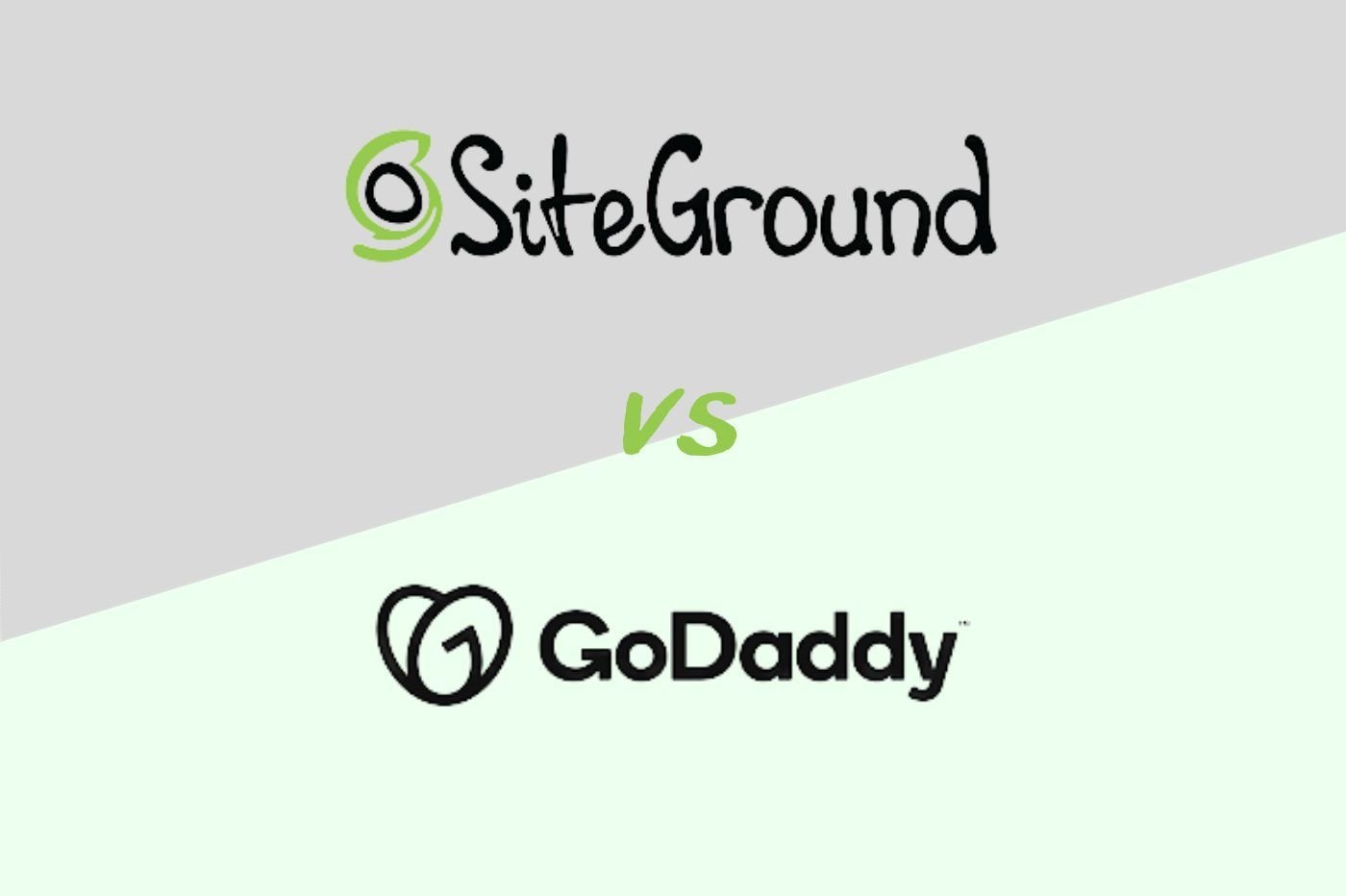
SiteGround vs GoDaddy: General Info
SiteGround is one of the best hosting services when it comes to being an all-around solution.
The web host excels in almost every important hosting aspect without compromising performance in any. Aside from being great all-around, we particularly recommend SiteGround for developers and anyone who needs a scalable web host.
GoDaddy excels mostly as a domain name registrar with only little relevance as a hosting provider.
This is not to say GoDaddy is not great, but we wouldn’t recommend it as one of the best web hosting services. It is a great choice for simple websites, especially personal blogs, portfolios, etc.
GoDaddy vs SiteGround: Which Has More Hosting Types & Plans?
One of the things we first looked at during this GoDaddy vs SiteGround duel was the availability of hosting types/plans.
Every website requires a particular hosting type depending on the resources it needs. The most common hosting types are shared, managed WordPress, Virtual Private Servers (VPS), cloud, and dedicated servers.
Shared hosting is for small sites because it is cheap and provides the lowest amount of resources due to many users sharing a server. VPS provides more power because the resources are allocated or isolated per hosting account. Hence, it is suitable for bigger sites.
Cloud hosting is better for a resource-intensive website because it uses the power of several interconnected servers. It is highly scalable too, making it easy to grow.
Managed WordPress is mostly a form of a cloud server or VPS tuned for hosting WordPress websites. Dedicated server hosting is the most powerful since it makes the whole power of a physical server available to you.
Since web hosts don’t necessarily provide all the hosting types, let us see whether GoDaddy or SiteGround has more.
SiteGround provides shared, managed WordPress, reseller, and cloud hosting types. Under each hosting type, except cloud, it has 3 packages. The cloud hosting type, on the other hand, has 4 pre-configured servers but you can still make a custom configuration for yourself. It is possible to configure a cloud server with up to 33 CPU cores, 1 TB SSD, and 130 GB RAM.
In contrast, GoDaddy provides shared, managed WordPress, VPS, Windows, and dedicated server hosting types. This shows that GoDaddy has more hosting types than SiteGround and of course more plans for scaling. However, since SiteGround has highly scalable cloud hosting services, it can provide resources that match GoDaddy’s dedicated servers.
Nevertheless, GoDaddy is the best choice if you need VPS, Windows hosting or a dedicated server.
In a nutshell, the winner of this aspect of the SiteGround vs GoDaddy analysis is the latter.
Which is More Affordable, SiteGround or GoDaddy?
An important aspect we considered while having our GoDaddy vs SiteGround duel was affordability.
Using an affordable web host helps to prevent unnecessary spending and keep the overhead costs of running a site at a minimum. An affordable web host provides all the necessary features a site needs without overcharging or upselling with add-ons. Thus, it provides an outstanding value for money. So, let’s find out whether SiteGround or GoDaddy is more affordable.
SiteGround’s most affordable plan, StartUp, costs around $3 per month but renews at $18 monthly.
The plan provides a free SSL certificate, 10 GB SSD disk space, automated daily backup, and free email hosting with an automated email migrator tool. Additionally, you will get unlimited bandwidth, free CDN, in-house caching, and outstanding security measures. The plan has all the essential features provided by the web host.

On the other hand, GoDaddy’s pricing (Web Hosting Economy) starts at around $7 per month and renews at about $18 monthly.
It includes 25 GB NVMe SSD storage, a free SSL certificate & domain name for the first year, 2 free Microsoft 365 mailboxes, daily backups, the capacity to host only one site, and unlimited bandwidth.
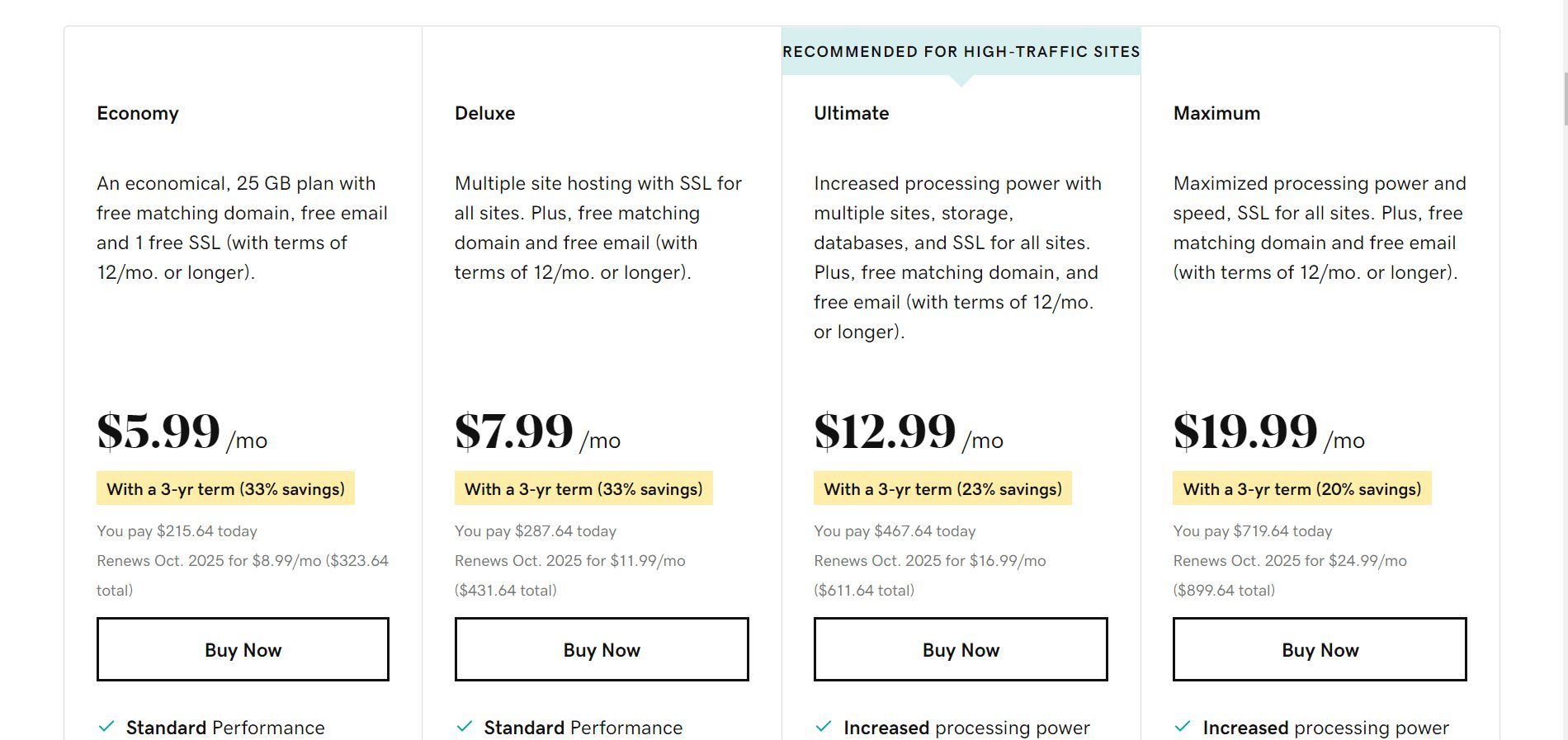
By comparison, we can see that while the SiteGround’s package is cheaper than GoDaddy’s for the introductory price, they renew at the same value. However, when we considered the rest of the plans, we discovered that even though SiteGround provides better introductory pricing, GoDaddy is more affordable upon renewal.
So it’s the latter that comes out on top in the SiteGround vs GoDaddy price comparison.
SiteGround Pricing
- GrowBig: costs almost $5 per month; renews at about $30 monthly.
- GoGeek: costs about $8 per month; renews at almost $45 per month.
GoDaddy Pricing
- Web Hosting Deluxe: costs around $10 per month; renews at about $14 monthly.
- Web Hosting Ultimate: costs almost $15 per month; renews at about $18 monthly.
- Web Hosting Maximum: costs $22 per month and renews at about $25 monthly.
Which Host Has More and Better Features? SiteGround vs GoDaddy
Websites are used for distinct purposes. As a result, they need different features to thrive. When choosing a web hosting provider for your website, it is important to note the one that has more of the features that are crucial to your growth.
This way, you won’t have to compromise unnecessarily or manage substandard features that will affect your site’s growth. Using a web host that lacks the needed features also sometimes leads to the need to use third-party services to complement them. This will, in turn, lead to more expenses. So, let us discuss the features of the web hosts so you can decide if SiteGround or GoDaddy is better for your site.
SiteGround Features
SiteGround has a lot of features and most of them are available on all its hosting plans at no extra charge. This makes the host an all-in-one solution for most websites as they end up not needing any third-party services.
Here are some of the features available at SiteGround to all users;
- One-click app installer
- Custom & beginner-friendly control panel (Site Tools)
- 10 GB to 1 TB SSD disk space
- A drag-and-drop WordPress website builder
- Multiple data centers & CDNs
- Automated daily and on-demand backups
- Enhanced custom security measures
- Free email hosting with a migrator tool
- Site staging tools & Git integration
- 24/7 multilingual customer support
GoDaddy Features
GoDaddy also has a lot of features but they are not as many as SiteGround’s. Moreover, based on our findings, most of the features it provides are free for only a limited time. Hence, the lack of some features and the need to separately renew others makes it quite costly.
Here are a few of the features GoDaddy provides;
- Free domain name registration & privacy protection
- Free email hosting via webmail; free 2 to 5 Microsoft 365 mailboxes for the first year
- Daily backups and free SSL certificates for security on select hosting packages
- 10 GB to 1 TB NVMe SSD storage
- Domain management & Premium DNS
- Unmetered bandwidth
- One-click app installer
- SSH access and FTP accounts
- 24/7 customer via live chat and phone calls
- Multiple data centers
- Windows servers
While it is evident that SiteGround is the winner of this round against GoDaddy, your choice should depend on the one that has more of the features you need.
SiteGround vs GoDaddy: Which Host Performs Better?
Another area we thoroughly looked into during our GoDaddy vs SiteGround comparison was performance.
One of the most important things to consider when choosing a web hosting provider is the minimum performance you need.
Performance comes in different ways and they all link to delivering the best experience to users, powering the site effectively, and maintaining great SEO success for most businesses. The performance aspects we are considering in our SiteGround vs GoDaddy comparison are speed, server software, uptime, data center locations, and ability to handle high-traffic sites.
Because of the fact that every web host uses different technologies, leading to distinct results, let us see whether GoDaddy or SiteGround is better for your website.
Web Server Software
The first thing we considered while doing a GoDaddy vs SiteGround comparison in terms of performance was the server software in use.
The software of a web server is one of the crucial determinants of its power. They give the servers the features and determine which projects they are suitable for. So, it is imperative to know the web server software a web host uses to see whether it can handle your website.
Based on our findings, GoDaddy uses Apache and Nginx web servers. While both of the web servers are generally great, Nginx is the better option. Apache web servers are for sites that receive very little traffic and do not need to constantly handle a lot of requests. Hence, they tend to overheat and cause downtime when used for high-traffic sites or during traffic surges.
Nginx servers, in contrast, are more powerful. They can handle sites with higher traffic and they take a longer time before overheating. Besides, Nginx servers support caching technologies that make them even better for sites that need outstanding performance.
GoDaddy primarily uses Apache web servers for its hosting plans, making them unsuitable for a high-traffic site in the long run. However, it is possible to use Nginx on your server if you are tech-savvy.
In contrast, SiteGround uses Nginx web servers for all its hosting plans. Not only that but it employs most of the latest technologies that improve the performance of the server. Therefore, SiteGround servers are more reliable. We will discover how the servers affect their performances in the coming sections.
SiteGround vs GoDaddy Speed Tests Comparison
The next performance aspect we dived into during our GoDaddy vs SiteGround analysis was speed.
Even though many factors affect performance, the loading speed of a website is basically the first thing even novices notice. This is because it determines the user experience on your website and whether visitors will stay. A good loading speed means visitors can navigate your site without issues (lags) and it results in more traffic. In turn, your revenue/business grows and you will experience better SEO success.
Conversely, a bad loading speed leads to high bounce rates and low traffic. This, of course, stalls your income flow and may affect your site’s SEO rankings badly since search engines like Google won’t send their searchers to a site that doesn’t perform well or better than the competition.
Now, let us see some of the terminologies used in measuring the speed performance of a site. The majority of them form the Core Web Vitals which sites or web pages have to pass to be considered optimized by Google.
- Time to First Byte (TTFB): indicates the total amount of time it takes your site’s server to communicate with the user’s browser. It is also referred to as the server connection time. Ideally, this should be 0.8 s or less.
- First Contentful Paint (FCP): shows how long it takes the first visible item on a web page to fully display on a user’s screen upon request. The item could be a text, an image, a button, etc. An ideal FCP should be less than 1.8 s.
- Largest Contentful Paint (LCP): the time taken by the largest visible item on the user’s screen to full display. It could be a big hero image, button, text, etc. A good LCP should be 2.5 s or less.
- Cumulative Layout Shift (CLS): it shows how stable your web page is based on the arrangements of elements on it. It depends on the coding of the site and the ability of the server to correctly interpret it. Generally, it affects the user experience on your web pages. An ideal CLS is 0.01 or less.
- Loading time: this is the total time it takes your web pages to fully load. At this time, all the elements on your page must be displayed on the user’s browser. Ideally, it should be 3 s or less.
SiteGround Speed Test
We carried out a SiteGround speed test using our general standards. Here, we installed WordPress on the server. We then installed the Neve theme together with one of its starter websites and its content.
Afterward, we analyzed the page using GTmetrix to determine its speed performance without any optimization.
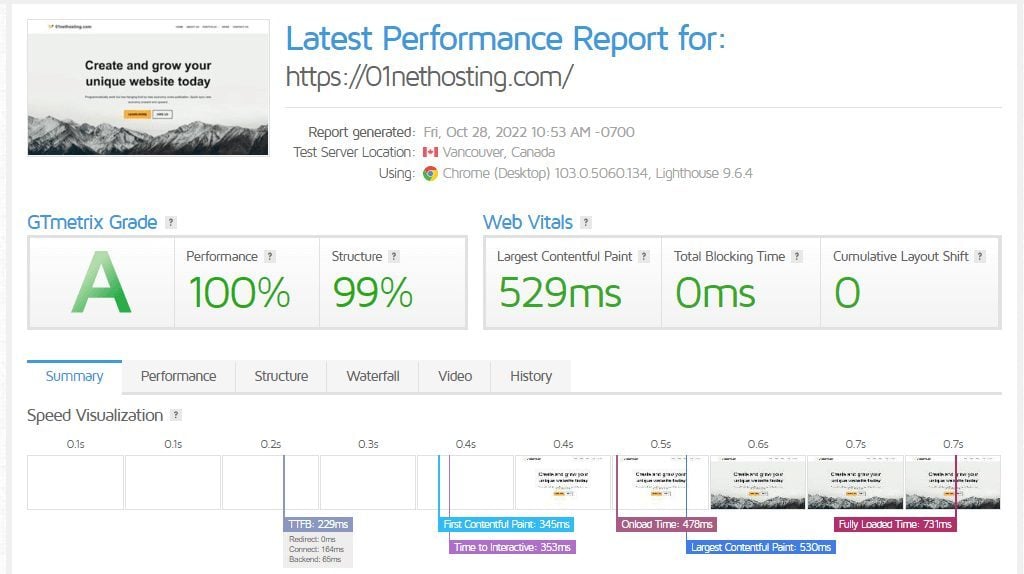
By the way, we used the GrowBig plan for our SiteGround review.
Here is the summary of the SiteGround speed test results:
- TTFB: 229 ms
- FCP: 345 ms
- LCP: 529 ms
- CLS: 0.00
- Loading time: 731 ms
From the results above, we can see that the SiteGround test website passed the standards set by the Core Web Vitals seamlessly. Therefore, SiteGround can power a fast website out of the box without issues and make it SEO-ready in terms of speed performance. Now, let us see how our GoDaddy performed against the Core Web Vitals.
GoDaddy Speed Test
We carried out the GoDaddy speed experiments using GTmetrix under the same conditions as the SiteGround test website. Here, we bought the Deluxe Web Hosting package for the test.
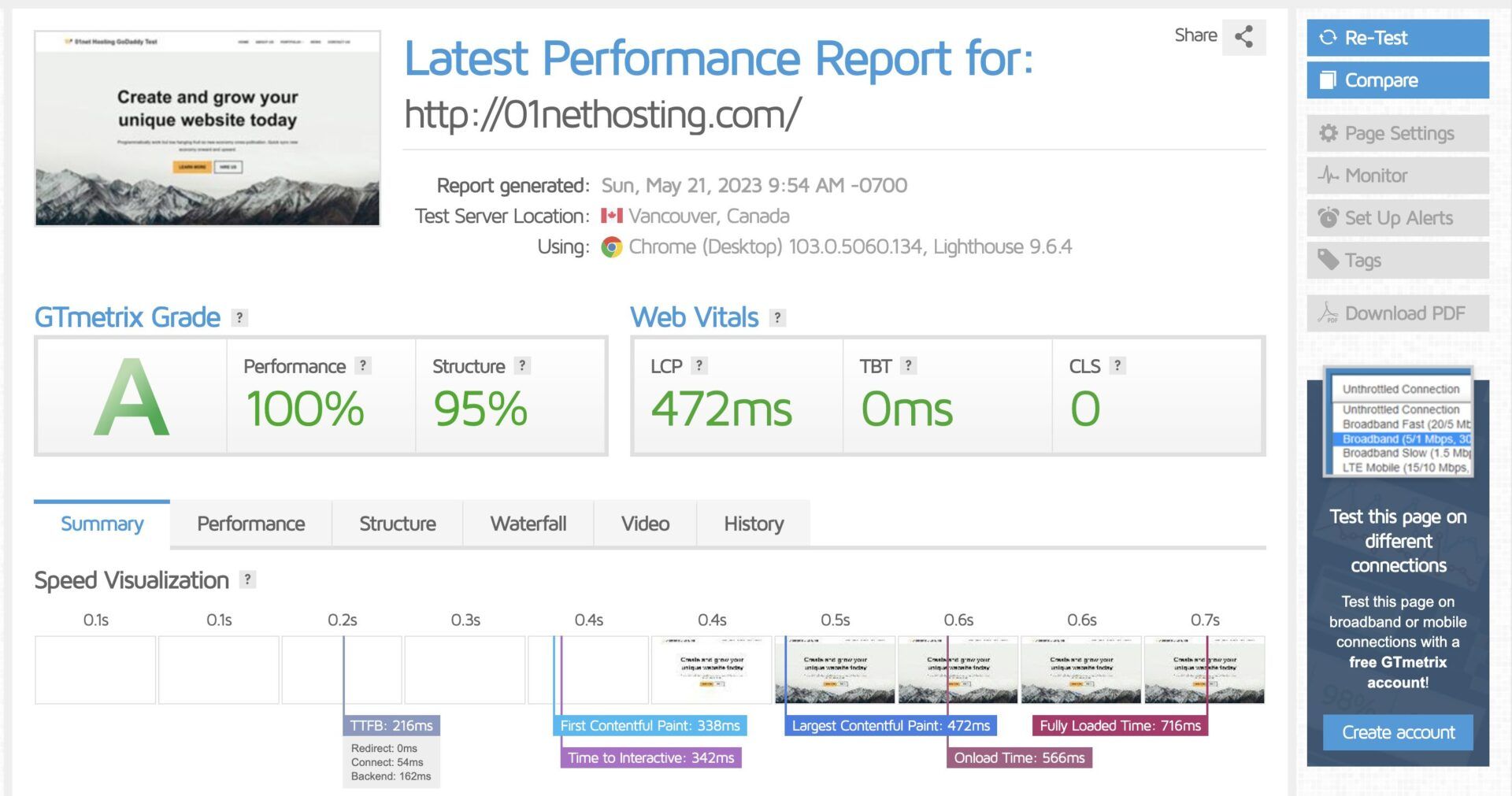
Here is how GoDaddy performed in our speed tests:
- TTFB: 216 ms
- FCP: 338 ms
- LCP: 472 ms
- CLS: 0
- Fully loaded time: 716 ms
By analyzing the results, we can see that the GoDaddy website also passed the Core Web Vitals test.
Therefore, it is great for hosting a fast website that loads in less than 1 second. Not only that, but the results are slightly better than what we recorded for SiteGround.
Hence, the winner of the SiteGround vs GoDaddy speed battle is the latter.
Load and Response Time Tests
Having discussed the speed performance of the hosts under normal circumstances, it is important to note that it is not possible for a site to receive only one visitor at a time. This is because most of the time, there are many people visiting a website simultaneously.
Because of this, the server has to process the requests of many visitors at a time. This puts more pressure on the server and sometimes leads to overheating, downtime, or crashes. Since the strengths of the servers used by hosting providers are distinct, let us see whether GoDaddy or SiteGround can handle a high-traffic site better.
For these experiments, we sent 1000 virtual visitors to our test websites using loader.io. The tool then recorded how the servers responded to the traffic. GoDaddy’s server delivered the fastest, average, and slowest response times at 215 ms, 1725 ms, and 3402 ms, respectively. Despite the horrible response times, only 38 visitors were able to visit the website. This indicates that it became unavailable or experienced downtime.
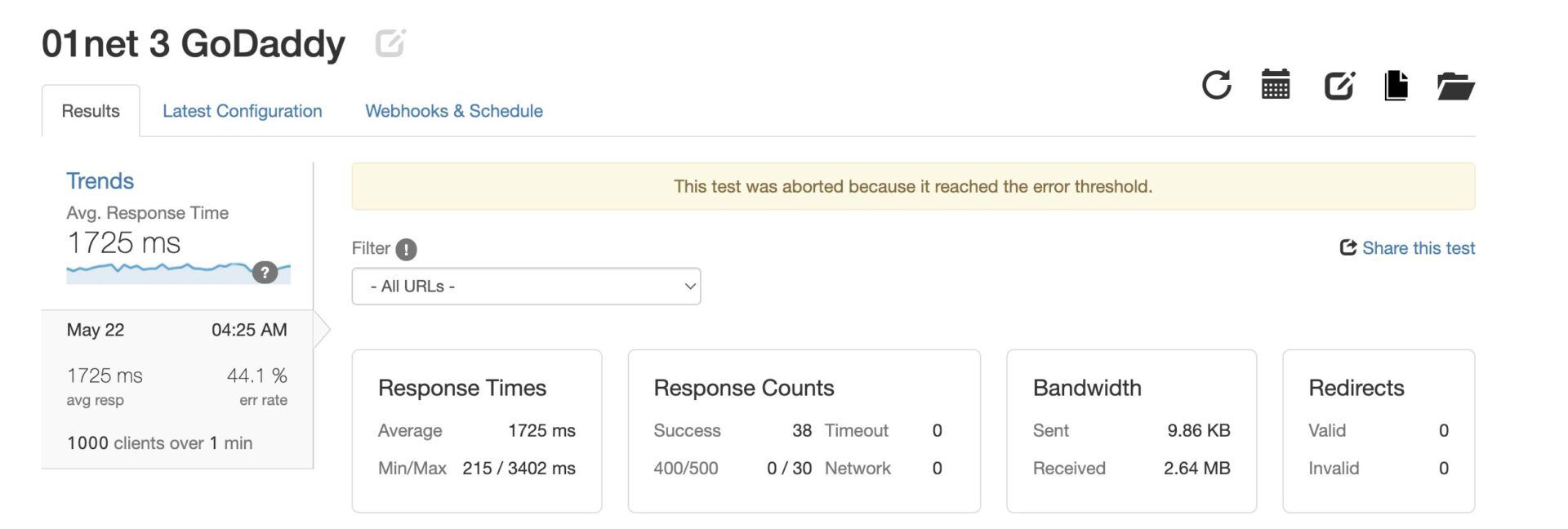
In contrast, our SiteGround server delivered 135 ms, 143 ms, and 442 ms, as the fastest, average, and slowest response times, respectively.
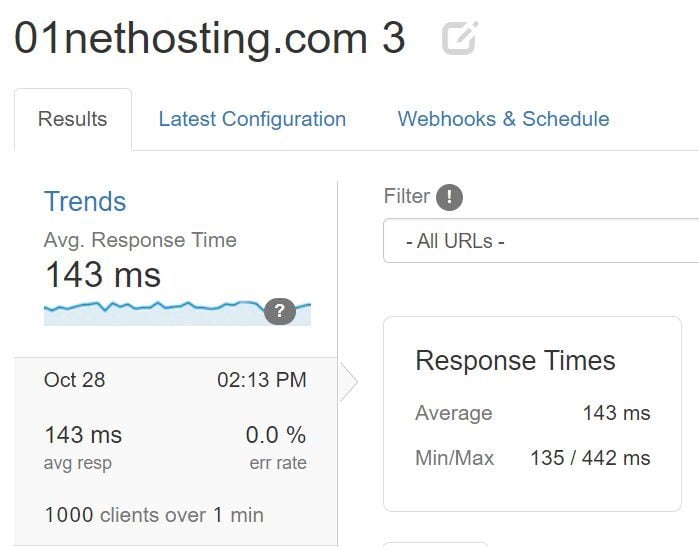
By comparing the results, SiteGround did not only deliver better response times but also experienced no downtime. All visitors were able to access the site’s content without delay, on average.
Hence, if you are considering using SiteGround or GoDaddy for a high-traffic site, our recommendation is the former all the way. This means SiteGround will be better at loading speed in the long run.
Uptime Tests
Another crucial performance yardstick we used for our SiteGround vs GoDaddy comparison for 2024 was uptime.
By uptime, we want to know whether SiteGround or GoDaddy is more reliable for staying online most of the time. This is because a site with good uptime doesn’t disappoint visitors or give them a reason to seek alternatives. Thus, they stay loyal and even recommend it to others, leading to more traffic and customers/revenue.
Whereas, when visitors notice a site experiencing downtime, they start to think of another way (a competition) that will get them access to their goal. Of course, this leads to a loss of traffic and eventually, revenue.
For this GoDaddy vs SiteGround comparison, we used the data gathered by Pingdom to determine which host had the better uptime.
According to the data, SiteGround had 99.998% uptime within a 6-month period while GoDaddy had 99.950%. This indicates that SiteGround is more reliable than GoDaddy as it experiences less downtime or outages.
Data Centers and Their Locations
The last aspect we looked into for our GoDaddy vs SiteGround performance comparison was data center location. Data centers are the physical locations of the server(s) powering a website. So when a user visits a website, they are requesting information from the data center.
That said, data transfer usually faces an issue referred to as network latency. Network latency refers to the delay in the data transfer within a network. Generally, since data has to travel to and fro between the visitors and the server location (center), the loading speed is highly impacted. So, the closer the data center is to the visitors, the faster the loading speed of the website. In contrast, when the data center is too far from the visitors, they experience the highest latency, leading to slow-loading web pages.
As a result, a good web host must have multiple data centers so that users can pick the one closest to their main audience for the best latency. Now, let us see whether SiteGround or GoDaddy has more data centers in multiple locations.
From our findings, SiteGround has about 11 data centers worldwide and it gives you the chance to make a choice. Aside from that, it has 17 CDN locations so that your visitors can still pick copies of your web pages from the data centers closest to them. Furthermore, you will be able to change your data center location to another one for a fee anytime you want.
Conversely, GoDaddy has 9 data centers in multiple locations worldwide. The web host lets you choose the one you want and you may decide to switch data centers for a fee later. Unlike SiteGround, GoDaddy does not have in-house CDNs but you can integrate a third-party service for the same purpose.
Thus, the winner of the GoDaddy vs SiteGround duel in terms of data center location is the latter.
SiteGround vs GoDaddy: Control Panel & User Experience
One of the main factors we consider when choosing a web hosting provider for any of our projects is the control panel and overall user experience. We believe that when a hosting provider has an easy-to-use control panel, it makes life easier for users.
This way, a user with or without technical knowledge will be able to navigate the control panel, create their site, and manage it easily with little to no learning curve. So, will SiteGround or GoDaddy be better in terms of ease of use? Let us find out!
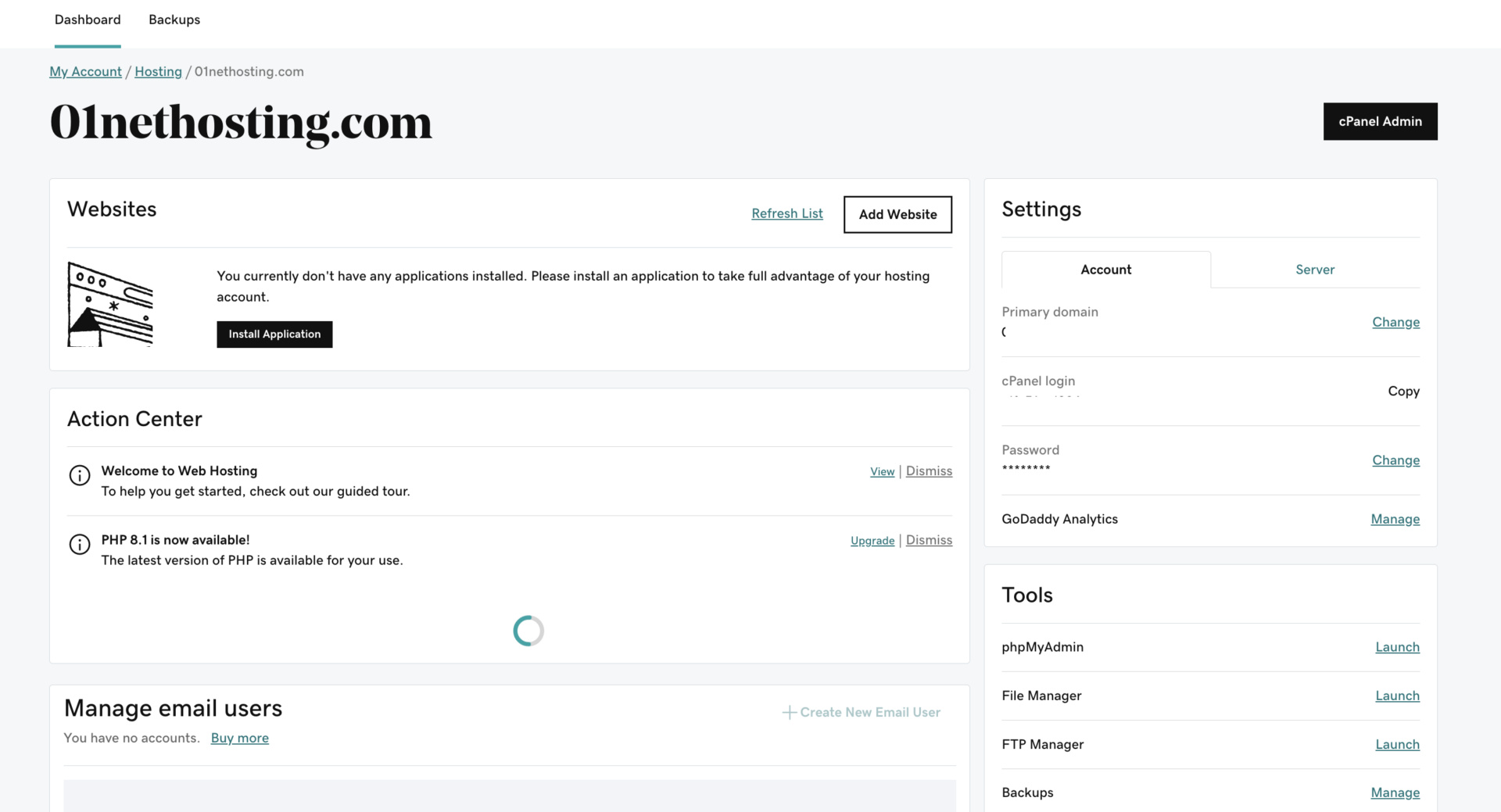
GoDaddy presents a navigable dashboard that comes with a cPanel integration. The cPanel houses most of the settings you can access on your GoDaddy account and determines what you can customize on your site.
Since there isn’t much you can do within the GoDaddy dashboard, the host provides direct links to some of the important settings on the cPanel. This way, you can access them directly without having to search for them when you log in to cPanel properly. Some of these settings include File Manager, Domains, Databases, and Installatron – a one-click app installer.
While GoDaddy is simple on its own, its reliance on the cPanel is not ideal. cPanel on its own is quite frustrating to understand by many beginners due to the presence of many features. In reality, some of these features are unnecessary and only confuse an average user. Hence, it makes managing a site on GoDaddy less appealing and more complicated.
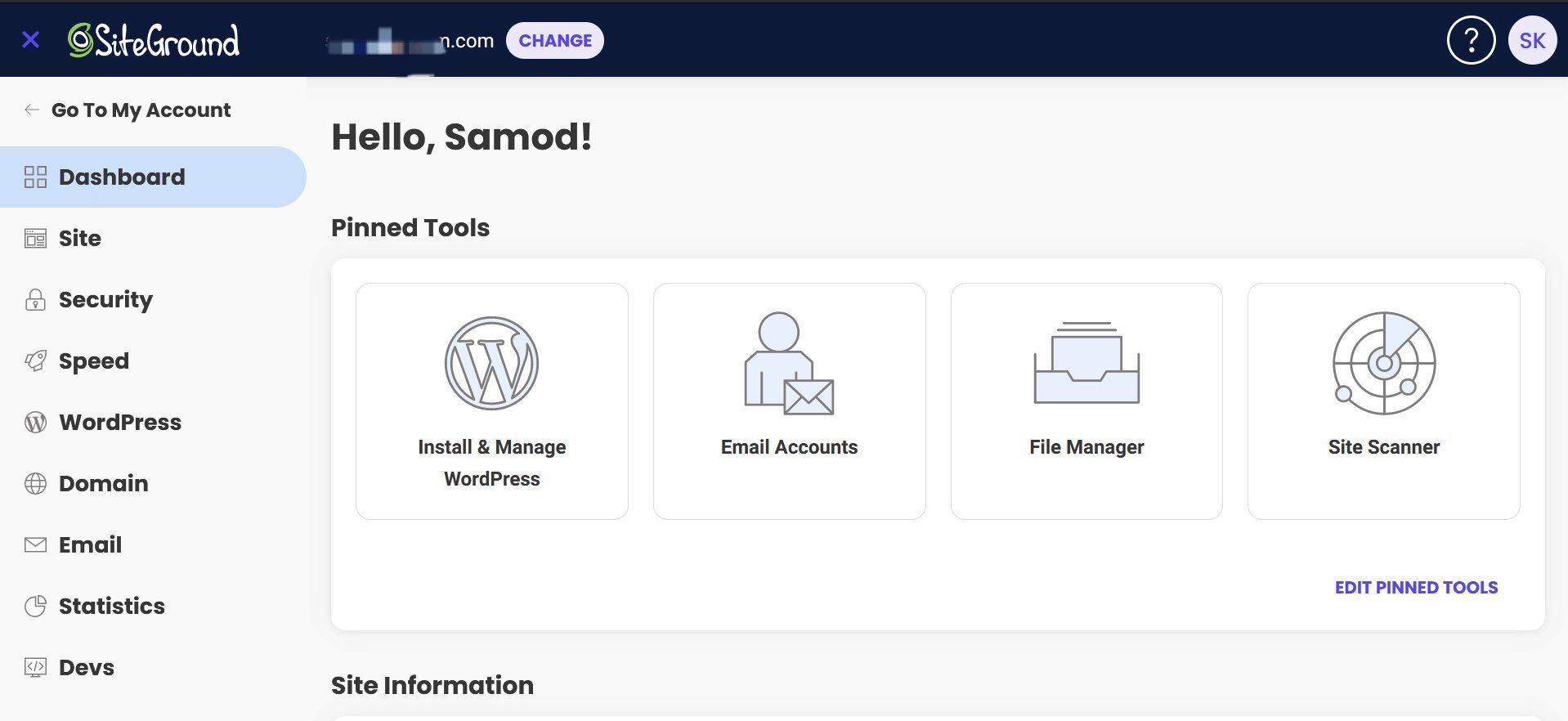
On the other hand, SiteGround has a proprietary control panel we refer to as Site Tools. Site Tools is one of the best control panels we have seen in the industry. The Site Tools is a feature-rich control panel but it is not as complicated as the cPanel. Instead, it provides only features, basic and advanced, that are really essential to a website. The best part is that it is quite easy to understand what every setting does based on texts and descriptions.
Further, the interface of the Site Tools makes it easy to navigate through the settings. The settings are arranged in the form of menus. Each menu is named after the main control, eg, Domain, and all major possible settings are submenus.
Aside from that, the Site Tools presents the most frequently accessed settings of your website as “pinned tools”. Besides, you will have the ability to change the settings that are under these pinned tools to the ones you want. Site Tools also lets you switch between the websites you want to manage easily and you can search for the tool you want for faster management.
In our opinion after trying out the control panels of both web hosts, the winner of the SiteGround vs GoDaddy comparison is the former.
Which is More Secure, GoDaddy or SiteGround?
Another factor we consider when picking a new host for our website projects is security. So, we decided to have a GoDaddy vs SiteGround duel to know which one is more secure.
Security comes in different ways and it is important that the website is totally secure. A secure website ensures that attackers are not able to steal sensitive information from the company or its clients. This way, clients can trust your website with their information and you won’t have to spend unnecessarily trying to clean up after a successful hack or attack.
Since the security of a website is mainly determined by the host because they have the server, choosing the right one is important. Otherwise, you may have to use third-party services that may cost a fortune.
Now, let us consider the security measures of both hosts to determine if SiteGround or GoDaddy is the better choice.
SiteGround is one of the most secure web hosting services we have seen in 2024. The web host ensures that all its users have secure websites by providing full security measures on all plans. This means your SiteGround website will be secure out of the box even without you lifting a finger. Some of the security measures are automated data backups, site staging, anti-DDoS protection, an AI anti-bot system for brute-force attacks, free SSL certificates, geo-distributed backups, malware scanning & removal, 24/7 server monitoring, and a WP all-in-one security plugin.
On the other hand, GoDaddy is not a highly secure web host. Of course, the hosting provider offers some security measures but they are not commercial-grade like SiteGround’s. GoDaddy provides free SSL certificates, automated daily backups, 24/7 server monitoring, and anti-DDoS protection. However, the free SSL certificate is only for the first year on most plans. So you will have to pay for the SSL certificates after the free year. Further, the automated daily backup only allows you to restore the data from the previous day. You need to pay additional fees if you want to restore earlier data.
By comparison, not only does SiteGround have more security features than GoDaddy but it is better in the ones they both provide as well.
Therefore, if we have to pick the winner in the SiteGround vs GoDaddy security analysis, the choice is the former for obvious reasons.
SiteGround vs GoDaddy: Customer Support
While customer support is the last area we considered in our GoDaddy vs SiteGround comparison, it is one of the most important.
Websites and hosting can be very complicated for both beginners and experts. So, when there is an issue we cannot seem to resolve using our expertise, it is only right to contact the support department of our hosting provider provided it is within their scope of support.
A good web hosting provider must fill its support department with competent agents with enough experience to tackle at least 99% of any issues users may have. Aside from that, they must always be available across several channels so that users, irrespective of their time zones can receive support at any time.
That said, let us find out if SiteGround or GoDaddy is better in terms of customer support.
GoDaddy has a great customer support system. The GoDaddy Guides provide support via live chats and phone calls (+1 480 366 3549) 24/7. One of the things we love the most about the customer support department at GoDaddy is that the phone channel is multilingual. Besides, there is a special phone number for almost every country GoDaddy supports.
From our experience, GoDaddy provides quality support with great availability. In fact, GoDaddy agents have one of the best response times we have seen in the industry so far. Nonetheless, the agents are not versatile enough. Most of the time, the customer-facing agents have to escalate some issues to other departments that customers cannot access directly via live chat. Therefore, it creates some kind of friction in the resolution process. In our opinion, GoDaddy agents should cross-train in order to be more versatile.
Similarly, SiteGround has an outstanding customer support department. In fact, based on firsthand user ratings, SiteGround is the best web host in terms of customer service. The web host provides customer support via live chats, tickets, and phone calls around the clock. This implies that irrespective of where you’re calling from, there is always a support agent ready to attend to you.
Drawing from our firsthand experience, SiteGround’s agents are always available and they’re highly responsive. Besides, they’re competent, reliable, and versatile. No matter how technical our reason for contact was, the agents were able to resolve it easily.
As a result, our choice in the SiteGround vs GoDaddy comparison in terms of customer support is the former.
Conclusion: Which is Better, SiteGround or GoDaddy?
GoDaddy and SiteGround performed great in our side-by-side comparison for 2024, but SiteGround has proven to be the better option.
According to the results, SiteGround is a better host for high-traffic websites that need a lot of resources, security, and features. Beginners will also find creating and managing a website with SiteGround much easier than with the competition.
Similarly, GoDaddy is a more affordable option for small websites. Yet. it may involve a little learning curve since site management is solely via cPanel.
Here is the summary of the SiteGround vs GoDaddy duel;
SiteGround vs GoDaddy Comparison Summary
| Yardsticks | Winner | Remarks |
|---|---|---|
| Availability of Hosting Type | GoDaddy | GoDaddy has more hosting types and plans than SiteGround. While we know SiteGround's cloud servers can fill in terms of resources, it loses in technology, especially when you need a bare metal dedicated server for your website or business. |
| Pricing | GoDaddy | SiteGround's plans generally cost less than GoDaddy's in terms of introductory pricing. Nonetheless, when it comes to renewal, GoDaddy is more affordable in the long run. |
| Essential Features | SiteGround | SiteGround is the most reliable host when it comes to features. The web host provides all the crucial features your website may need for free without any tricks or hidden charges. GoDaddy, on the other hand, upsells its essential features. |
| Loading Speed | GoDaddy | GoDaddy is slightly better than SiteGround in terms of loading time as it is faster with a few milliseconds. |
| Uptime | SiteGround | If you need your website to be online most of the time, our findings have revealed that SiteGround is better at ensuring that. |
| Load & Response Time | SiteGround | Based on our tests, SiteGround is better for hosting a high-traffic website than GoDaddy. While it excels during traffic surges without any lags or hiccups, the competition crashes. |
| Data Center | SiteGround | SiteGround has more data centers than GoDaddy worldwide. Further, it has about 17 free CDNs to reduce network latency. |
| User Experience | SiteGround | SiteGround has a very powerful proprietary control panel called Site Tools. It is feature-rich and intuitive to use. GoDaddy, on the other hand, relies on the cPanel for site management. |
| Security | SiteGround | SiteGround provides many free and relevant security measures to all users. Whereas, GoDaddy hoards is security features in order to upsell users. |
| Customer Support | SiteGround | SiteGround's agents are generally more reliable and competent in resolving issues quickly. |
| Web Server Software | SiteGround | Even though it supports Nginx, GoDaddy primarily uses Apache. Since SiteGround uses Nginx out of the box, its servers are more powerful and reliable. |